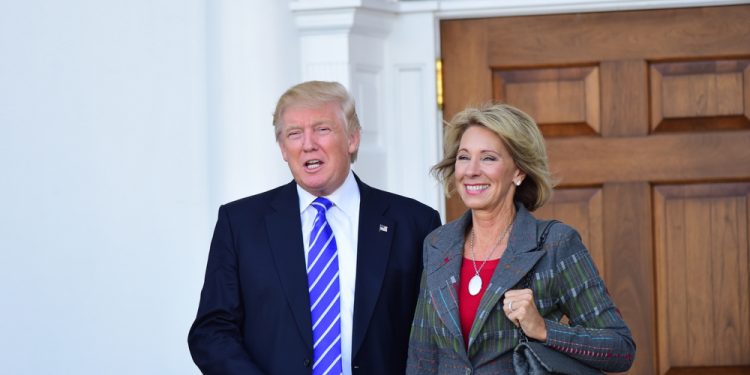
As liberal special interests try to muddy Betsy DeVos’ sterling education record, they are pointing to a handful of one-sided news stories that cherry-pick data and fail to tell the whole story
January 18, 2017

As liberal special interests try to muddy Betsy DeVos’ sterling education record, they are pointing to a handful of one-sided news stories that cherry-pick data and fail to tell the whole story
January 18, 2017
As liberal special interests try to muddy Betsy DeVos’ sterling education record, they are pointing to a handful of one-sided news stories that cherry-pick data and fail to tell the whole story.
The fact is that multiple studies have confirmed that charter schools championed by DeVos have improved education for Michigan’s children. Indeed, a recent analysis found that students in charters demonstrated greater proficiency in all four subject areas than students in traditional public schools, as measured in the state’s annual assessment, the Michigan Student Test of Educational Progress (M-STEP). The analysis found that:
Further, Stanford University’s Center For Research On Education Outcomes (CREDO) conducted a study in March 2015 and found that the average Detroit charter school student showed stronger academic improvement than peers in Detroit public schools.
The average Detroit charter school student is showing stronger academic improvement than peers in Detroit Public Schools, according to a report that found similar gains for charter students in many of the 41 urban regions studied nationwide.
On top of that, a CREDO study from January 2013 found that nearly a majority of charter school students performed “significantly better” than public school students in reading and math.
These findings led CREDO to conclude that “the typical student in Michigan charter schools gains more learning in a year than his TPS (traditional public school) counterparts, amounting to about two months of additional gains in reading and math.”
In reading, 47 percent of charter schools perform significantly better than their traditional public school market, which is more positive than the 35% for Michigan charter schools as a whole. In math, 47 percent of Detroit charter schools perform significantly better than their local peers, the same proportion as for the charters as a whole statewide.
Furthermore, independent rankings have found that Michigan has one of the nation’s strongest performing charter school systems in the country. According to the National Alliance For Public Charter Schools, Michigan ranks 3rd in the country for the “healthy” level of its charter sector, a testament to DeVos’ work in the state.
These successes could have been more widespread but bureaucratic regulations prevented DeVos’ reform efforts from taking effect more broadly. The Detroit News noted as much in an editorial following DeVos’ selection:
“One of the criticisms of charter schools is that they too often don’t perform much better academically than the traditional public schools. But there’s a good reason for that. Policymakers have saddled charter schools with the same curriculum and testing requirements as the traditional public schools, and so they are forced to teach for the most part in the same way. Most schools in the public sector have not fully embraced technology or new methods of learning.”
While political opponents continue to distort DeVos’ record, studies confirm that the efforts she has supported are improving both proficiency and learning gains made by Michigan’s young people, expanding their horizons and potential to have meaningful, productive lives.